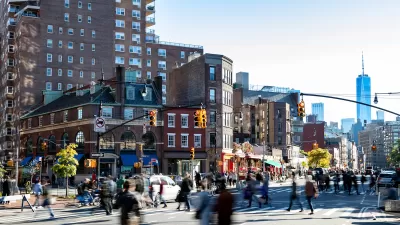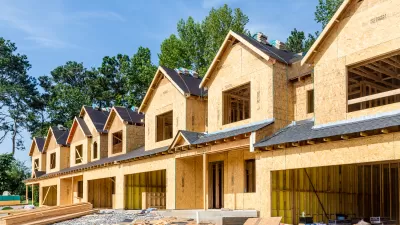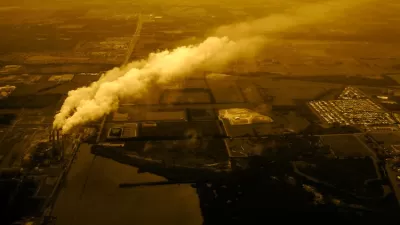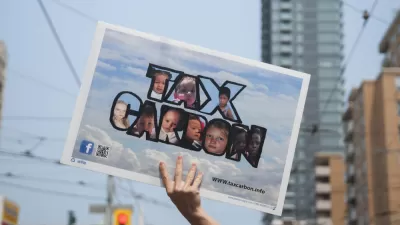Governments must take correction actions to address climate change, warned Pope Francis in his June 18 encyclical, but cap-and-trade, which places a price on carbon emissions but can lead to speculation, is not one of them.
"Pope Francis, in his highly anticipated call to action against climate change, took an unexpected swipe at the cap-and-trade systems used in both California [PDF] and Europe to control greenhouse gases," writes David R. Baker, energy and clean tech reporter for the San Francisco Chronicle. "They may sound good, the pontiff argued. But they won’t work."
“The strategy of buying and selling ‘carbon credits’ can lead to a new form of speculation which would not help reduce the emission of polluting gases worldwide,” Francis wrote in his wide-ranging encyclical on the environment and global warming.
“This system seems to provide a quick and easy solution under the guise of a certain commitment to the environment, but in no way does it allow for the radical change which present circumstances require,” he wrote. “Rather, it may simply become a ploy which permits maintaining the excessive consumption of some countries and sectors."
The pope is not the first to level the "speculation argument" against cap-and-trade. One of the first climate scientists to address climate change, award-winning Dr. James Hansen of NASA's Goddard Institute for Space Studies (now retired), warned that the carbon trading system will "enrich the trading desks of banks, which have a new market to explore" in a 2012 article by Baker posted here.
The Nobel Prize-winning New York Times Op-Ed columnist, Paul Krugman, who supports cap-and-trade, addressed this argument in a 2009 column:
Any time you have a market, there’s some opportunity for speculation. Even if the good being traded isn’t storable, there may be a futures market, so you can bet on the future price.
But he warns that the speculation argument is "not a case of the perfect being the enemy of the good, it’s a case of the perfect being an enemy of the planet."
The alternative to carbon pricing—of which cap-and-trade is one approach, are more regulations. "A smarter way would be to require that all power plants meet a certain standard, create a regulation and force them to meet it, wherever they are,” Kathryn Phillips, the Sierra Club's director for California, told the Chronicle.
Krugman references that approach at the end of his column.
The solution to climate change must rely to an important extent on market mechanisms — it’s too complex an issue to deal with using command-and-control. That means accepting that some people will make money out of trading — and that yes, sometimes trading will go bad. So? We’ve got a planet at stake; it’s crazy to cut off our future to spite Goldman Sachs’s face.
No word on whether the carbon tax would receive the pope's blessing, but I suspect he might be partial to carbon tax and dividend due to the equity aspect as those who benefit the most are those who pollute the least. It did receive Hansen's blessing.
The New York Times indicated that "(c)entral to Francis’ theme is the link between poverty and the planet’s fragility." World Bank President Jim Yong Kim noted the connection between carbon climate change and poverty, and explained that carbon pricing was essential to tackling both in a 2013 PBS NewsHour segment posted here.
Hat tip to Josh Stephens who noted the cap-and-trade exception in his post on the encyclical in the California Planning & Development Report.
FULL STORY: Pope blasts California’s cap-and-trade system

Pennsylvania Mall Conversion Bill Passes House
If passed, the bill would promote the adaptive reuse of defunct commercial buildings.

Planning for Accessibility: Proximity is More Important than Mobility
Accessibility-based planning minimizes the distance that people must travel to reach desired services and activities. Measured this way, increased density can provide more total benefits than increased speeds.

Fair Housing Cannot Take a Back Seat to ‘Build, Baby, Build’
If we overlook fair housing principles in the plan to build US housing back better, we risk ending up right back where we started.

LA Metro Board Approves New 710 Freeway Plan
The newest plan for the 710 corridor claims it will not displace any residents.

Austin’s Proposed EV Charging Rules Regulate Station Locations, Size
City planners say the new rules would ensure an efficient distribution of charging infrastructure across the city and prevent an overconcentration in residential areas.

Making California State Parks More Climate-Resilient
A recently released report offers recommendations for keeping state parks healthy and robust, including acquiring additional land for conservation and recreation.
City of Costa Mesa
Licking County
Barrett Planning Group LLC
HUD's Office of Policy Development and Research
Mpact Transit + Community
HUD's Office of Policy Development and Research
Tufts University, Department of Urban and Environmental Policy & Planning
City of Universal City TX
ULI Northwest Arkansas
Urban Design for Planners 1: Software Tools
This six-course series explores essential urban design concepts using open source software and equips planners with the tools they need to participate fully in the urban design process.
Planning for Universal Design
Learn the tools for implementing Universal Design in planning regulations.


























